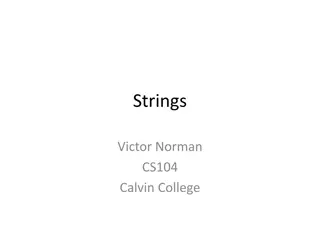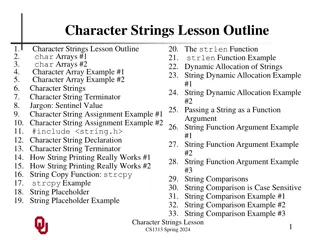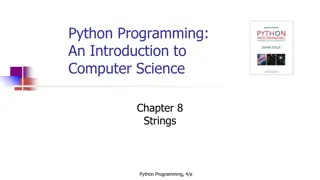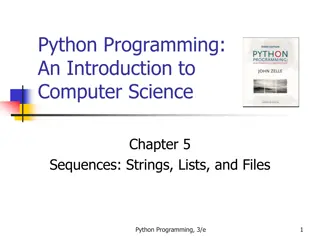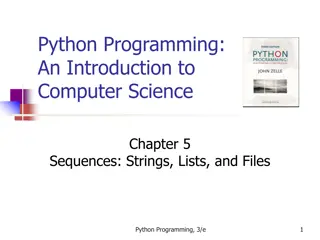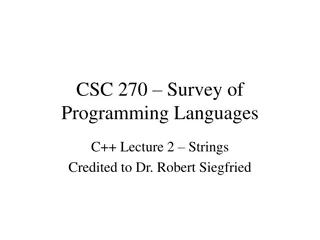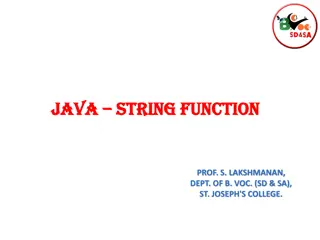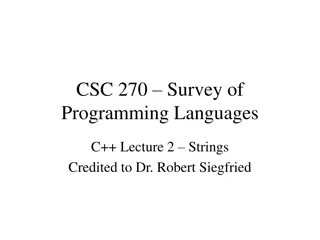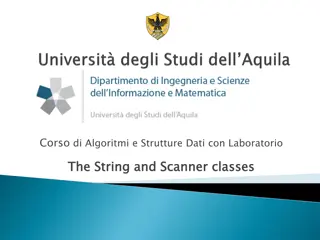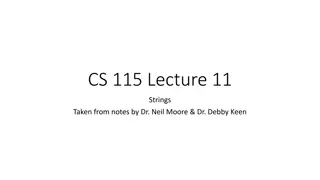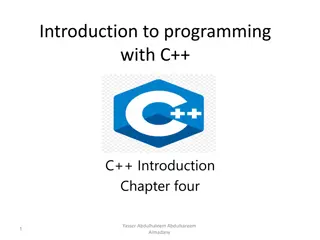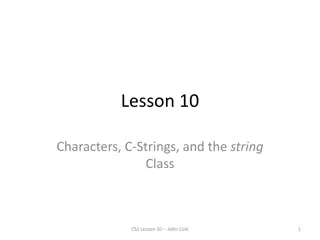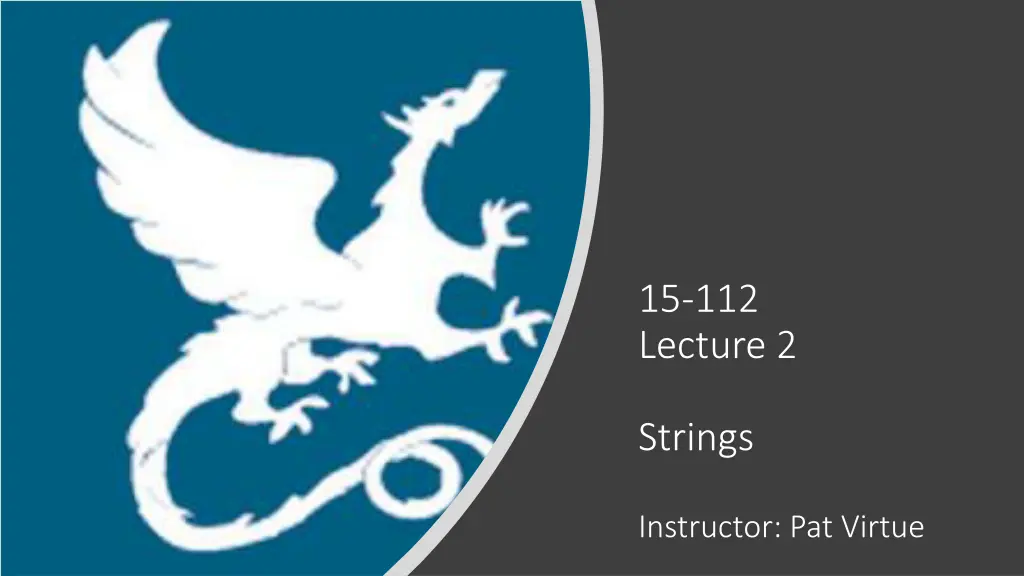
Mastering Strings in Python: Tips and Exercises
Explore the world of strings in Python with this comprehensive guide covering lecture insights, logistics, announcements, weekly rhythms, and post-quiz exercises. Enhance your programming skills by diving into string manipulation and practical exercises. Get ready to level up your Python proficiency!
Download Presentation

Please find below an Image/Link to download the presentation.
The content on the website is provided AS IS for your information and personal use only. It may not be sold, licensed, or shared on other websites without obtaining consent from the author. If you encounter any issues during the download, it is possible that the publisher has removed the file from their server.
You are allowed to download the files provided on this website for personal or commercial use, subject to the condition that they are used lawfully. All files are the property of their respective owners.
The content on the website is provided AS IS for your information and personal use only. It may not be sold, licensed, or shared on other websites without obtaining consent from the author.
E N D
Presentation Transcript
15-112 Lecture 2 Strings Instructor: Pat Virtue
As you walk in Quiz will start at the beginning of lecture Have pencil/pen ready Silence phones
Quiz Before we start Don t open until we start Make sure your name and Andrew ID are on the front Read instruction page No questions (unless clarification on English) Additional info 25 min
Announcements Quiz Grades Regrade requests, same as last week Fix-its, same as last week Canvas We re still organizing and getting basics setup Participation is next to setup Participation will start to include recitation attendance Course It will keep ramping up Come get help
Announcements Weekly Rhythm Assignments/Quizzes Today, HW3 released Thu, Pre-reading 4 released Sat, 8 pm: HW 4 Mon, 8 pm: Pre-reading 4 Next Tue, in-lec: Quiz 3
Announcements Quiz Review quiz results in Gradescope Watch solution session recording if you missed the live zoom session Regrade requests See Piazza for details Fix-its! See Piazza for details Canvas Work in progress: we re getting scripts setup to sync Canvas Grades TODO: Participation: Lecture Polls + Recitation Attendance
Announcements Weekly Rhythm Assignments/Quizzes Today, Pre-reading 4 released soon Fri: Fix-its due Sat, 8 pm: HW 3 Mon, 8 pm: Pre-reading 4 Next Tue, in-lec: Quiz 3
Post-quiz Exercise What is the correct response to the following? pet = "manatee" s = pet[:4]*2 Then Google search: s
Poll 1 def ct(s): n = ord(s) n += 2 return chr(n) What does this print? A. A B. B print(ct('C')) C. C D. D E. E F. F G. G H. None of the above
Ascii, Unicode, and Emojis! (and a tiny bit of hexadecimal)
Viewing invisible characters repr(s)
Poll 2 # 1234567890 print(len('\noodles\\')) What does this code print? A. 6 B. 7 C. 8 D. 9 E. 10 F. 11 G. (Python crashes) H. I have no idea
Esacape characters Popular escape characters \n New line \t Tab \\ \
String length, indexing, and slicing 012345678 s = 'brown cat' len(s) s[2] s[-2] s[1:7:3]
Poll 3 (unused) Which is better? B) A) # Given string s for i in range(len(s)): # Given string s for c in s: # Do stuff # Do stuff
Poll 4 def ct(s): return s[1:-1] + s[0] What does this code print? A. abcde print(ct('abcde )) B. edcba C. bcdea D. bcda E. ba F. ab G. (Python crashes) H. I have no idea
Reference slide String indexing and slicing Indexing c = s[index] # c will be character at position index Valid indices Positive: 0 to len(s)-1 (but not len(s)) Negative: -len(s) to -1 Slicing s[start:end:step] Similar to range arguments Doesn t include end There are default values if any of these are left blank (Gets a bit goofy with a negative step)
Poll 5 def mystery(s): return s[::-1] What does this function do? A. Return a copy of s B. Return the reverse of s C. Return string that is only the last character of s D. Return string that is only the first character of s E. Return None F. (Python crashes) G. I have no idea
String operations sNew = s1 + s2 sNew += s3 Pattern: Building up a result Building up a string Sketch: Start with empty string: result = '' Loop adding to string as needed: result += nextChar
String operations sNew = s1 + s2 sNew += s3 Pattern: Building up a result Building up a string Sketch: Start with empty string: result = '' Loop adding to string as needed: result += nextChar Example: def reverseString(s): newString = '' for c in s: newString = c + newString return newString
s = 'dog' s.upper() s[0] = 'm' print(s) Poll 6 What does this print? A. dog B. DOG C. mog D. MOG E. mOG F. (Python crashes) G. I have no idea
Functions vs Methods String functions take in a string (return something useful) Like a all the functions that we ve been working with chr(s) ord(s) len(s) repr(s) Methods on the other hand have a different syntax:
Reference slide String methods Some convenient methods that return Boolean values s isalnum isalpha isdigit islower isspace isupper ABCD True True False False False True ABcd True True False False False False abcd True True False True False False ab12 True False False True False False 1234 True False True False False False False False False False True False AB?! False False False False False True
Strings are immutable Once a string object is created, we can t change it. This is what we call immutable Actually, everything we have used so far is immutable: ints, floats, etc. (they just aren t very interesting objects) It might see as though you can change strings but we can t. It always ends up as some new string object. This will be much more relevant once we get to our first mutable object type, lists!
s = 'lil' t = s s += 'nasx' Poll 7 What does this print? A. lil B. nasx print(t) C. lilnasx D. (Python crashes) E. I have no idea
Strings and aliases Two variables are aliases are when they reference the exact same object. This happens when you assign a variable to another variable: s = 'abc' t = s s and t are aliases referencing the same to the same exact string object 'abc But strings are immutable. We can t possibly change s without making a new string. s += 'def' # Assigns s to a new string 'abcdef # The string t is referencing remains 'abc'
Strings and aliases Two variables are aliases are when they reference the exact same object. This happens when you assign a variable to another variable But strings are immutable. We can t possibly change s without making a new string.
String operations sNew = s1 + s2 sNew += s3 Pattern: Building up a result Building up a string Sketch: Start with empty string: result = '' Loop adding to string as needed: result += nextChar Example: def reverseString(s): newString = '' for c in s: newString = c + newString return newString
Pattern: Keeping track of state in a loop Use a variable to keep track of the state you are in during a loop def collapseWhitespace(s): result = '' isWhite = False for c in s: if c.isspace(): if not isWhite: result += ' ' isWhite = True else: isWhite = False result += c Sketch: Start with initial state: currentState = False Loop Check for changes and adjust state variable Example: Collapse consecutive whitespace down to a single space return result
Style: variable/function names Camel case: myNewVariable Snake case: my_new_variable Design Challenge def toCamelCase(s): pass assert(toCamelCase('goodToGo') == 'goodToGo') assert(toCamelCase( Hi Walter') == 'hiWalter') assert(toCamelCase('add_all_the_numbers') == 'addAllTheNumbers')
Style: variable/function names Camel case: myNewVariable Snake case: my_new_variable Design Challenge def toCamelCase(s): pass assert(toCamelCase('goodToGo') == 'goodToGo') assert(toCamelCase('goodtogo') == 'goodtogo') # Oh well assert(toCamelCase('Hi Walter') == 'hiWalter') assert(toCamelCase('add_all_the_numbers') == 'addAllTheNumbers')
Poll 8 (unused) Which of the following would you want to use in your toCamelCase(s) implementation? Select ALL that apply A. For loop over the characters in the string B. isalnum C. isalpha D. isdigit E. islower F. isspace G. isupper H. None of the above
Design Challenge def printFunctionInfo(code): pass Output code = """\ def f(x): return 4*x def ct(x, y, z): return f(x) + f(y+1) + f(x+2) print(ct(2)) """ Function f takes parameters: x Function ct takes parameters: x y z print(code) #print(repr(code)) printFunctions(code)
Output Design Challenge Function f takes parameters: x Function ct takes parameters: x y z def printFunctionInfo(code): for line in code.splitlines(): name, params = parseLine(line) if name is not None: print(f'Function {name} takes parameters: ) for param in params.split(', ): Top-down design param = param.strip() print(f"\t{param}") def parseLine(line): ''' Extract the function name and parameters given a line of code Returns two strings: -- Function name (no def, no parentheses) -- parameters (one string that includes any commas; may be empty string) Returns None, None if no function defined on the line '''
def parseLine(line): ''' Function comment ... ''' line = line.strip() if line[4:] != "def ": return None Design Challenge remainingLine = line[4:] name = "" params = "" foundOpenParenthesis = False for c in remainingLine: if c == '( : foundOpenParenthesis = True continue Pattern: Building up a result if c == ') : break if not foundOpenParenthesis: name += c else: params += c return name, params
def parseLine(line): ''' Function comment ... ''' line = line.strip() if line[4:] != "def ": return None Design Challenge remainingLine = line[4:] name = "" params = "" foundOpenParenthesis = False for c in remainingLine: if c == '( : foundOpenParenthesis = True continue if c == ') : break if not foundOpenParenthesis: name += c else: params += c Pattern: State in a loop return name, params




